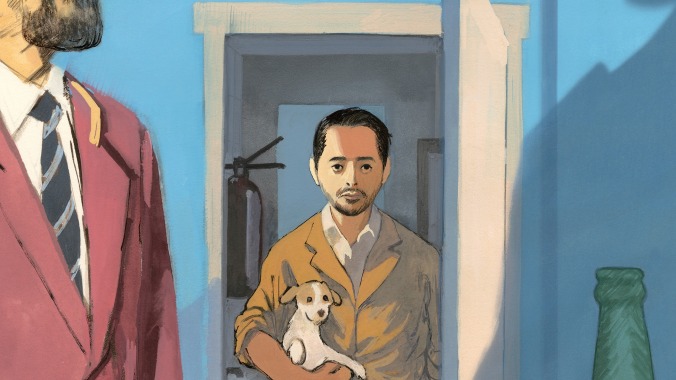Finland's deadpan Aki Kaurismäki comes home with the Capra-esque Other Side Of Hope

The Other Side Of Hope begins like one of those 1930s French movies about angry barge workers or existentially compromised longshoremen: shots of faceless workers at the Helsinki docks; close-ups of bollards and ropes; dusk falling over the clamshell bucket cranes. From the coal hold of a Polish freighter, a Syrian stowaway named Khaled (Sherwan Haji) emerges, covered head to toe in coal dust, and escapes into the city. Cut to a cheerless Helsinki apartment, where the hefty middle-aged shirt salesman Wikström (Sakari Kuosmanen) packs his things into a little suitcase and silently returns his wedding ring to his wife, who is chain-smoking Chesterfields next to a grotesquely oversized potted cactus. The narrative trajectories of the refugee and the salesman intersect within minutes (literally, at an intersection), though they won’t meet again until later, as boss and employee, after Wikström has become the unlikely owner of a failing restaurant called the Gold Pint.
This motif of fresh starts and new lives has been an ironic constant for Aki Kaurismäki, the writer-director whose deadpan morality plays and minimalist melodramas have defined Finnish cinema for the rest of the globe since the 1980s. His characters—traditionally glum, greasy-haired sub-proletarians—yearn for change, yet the kitsch world of his films remains as undisturbed as a grandparent’s plastic-encased furniture. But an artist is someone who works through their tastes and eccentricities and not for them; the restaurant, the latest in a succession of delightfully drab eateries in the Kaurismäki-verse, is a national allegory, and the apparent contradiction between the movie’s timeliness (refugee crisis, white nationalism, etc.) and timelessness probably says something about the state of Europe, too. After all, this is the first movie that Finland’s most celebrated director has made in his home country since 2006’s Lights In The Dusk.
Behind the familiar drollery and tunelessly drowsy twang-rock is a Frank-Capra-esque humanism that seems to bring out both the worst and best in Kaurismäki. The scenes at Wikström’s restaurant feature some of the filmmaker’s hackiest humor, including an over-extended sequence in which the new owner of the Gold Pint attempts to unsuccessfully reinvent it as a sushi joint. But the poignant portions that focus on Khaled—as he turns himself into the authorities, makes friends at a refugee barracks, and tries to find his lost sister, Miriam (Niroz Haji)—contain some of his purest filmmaking, including a close-up of coaly water sludging down the drain of a pay shower that has to be one of the most lyrical shots in his body of work. No Kaurismäki movie is complete without a visit to a nondescript drinking hole, but from the point-of-view of Khaled and his buddy Mazdak (Simon Hussein Al-Bazoon), the scene turns into a bittersweet miniature—two refugees looking for normalcy in the unfamiliar country they may have to call home.
While earlier Kaurismäki films like Shadows In Paradise and The Man Without A Past represented blue-collar subversions of melodramatic plot points and classic movie genres, The Other Side Of Hope could best be described as a commentary on “Kaurismäki themes.” (It’s also a partial refinement of the refugee plot of his French-set Le Havre.) In that respect, it may be self-conscious to a fault. Plotted with typical shagginess, it lags as it tries to treat its two protagonists equally; they may be kindred spirits, but Khaled’s fears of deportation and his search for Miriam are a lot more urgent than Wikström’s mid-life crisis. But in drawing the two men together, the film creates a simple, persuasive metaphor. Khaled is a former car mechanic who ended up on a ship headed to Helsinki while evading skinheads at a Polish dock; Wikström sold shirts before winning a small fortune at a high-stakes poker game. The circumstances are pure chance, but now they both have to do their part in keeping this dismal restaurant open.